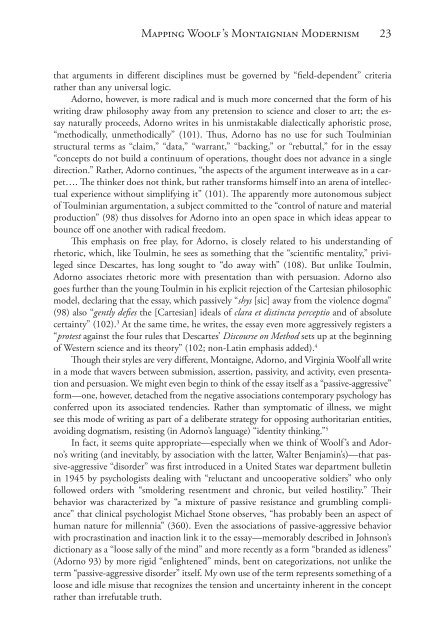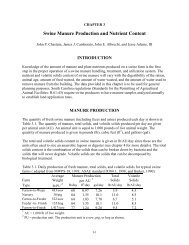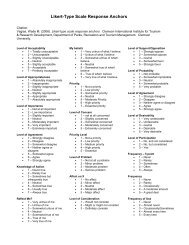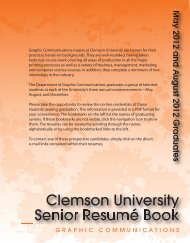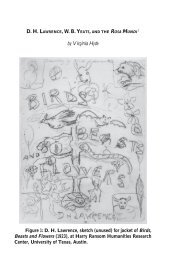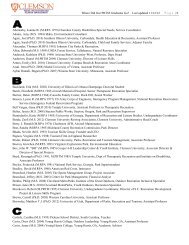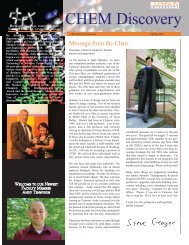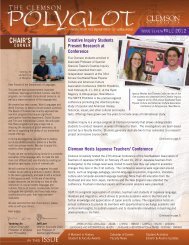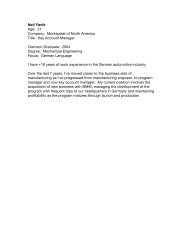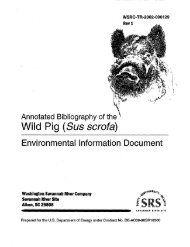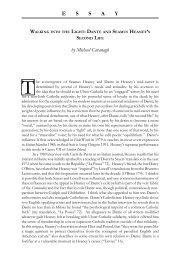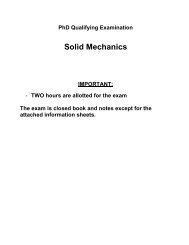Woolfian Boundaries - Clemson University
Woolfian Boundaries - Clemson University
Woolfian Boundaries - Clemson University
Create successful ePaper yourself
Turn your PDF publications into a flip-book with our unique Google optimized e-Paper software.
Mapping Woolf’s Montaignian Modernism<br />
that arguments in diff erent disciplines must be governed by “fi eld-dependent” criteria<br />
rather than any universal logic.<br />
Adorno, however, is more radical and is much more concerned that the form of his<br />
writing draw philosophy away from any pretension to science and closer to art; the essay<br />
naturally proceeds, Adorno writes in his unmistakable dialectically aphoristic prose,<br />
“methodically, unmethodically” (101). Th us, Adorno has no use for such Toulminian<br />
structural terms as “claim,” “data,” “warrant,” “backing,” or “rebuttal,” for in the essay<br />
“concepts do not build a continuum of operations, thought does not advance in a single<br />
direction.” Rather, Adorno continues, “the aspects of the argument interweave as in a carpet….<br />
Th e thinker does not think, but rather transforms himself into an arena of intellectual<br />
experience without simplifying it” (101). Th e apparently more autonomous subject<br />
of Toulminian argumentation, a subject committed to the “control of nature and material<br />
production” (98) thus dissolves for Adorno into an open space in which ideas appear to<br />
bounce off one another with radical freedom.<br />
Th is emphasis on free play, for Adorno, is closely related to his understanding of<br />
rhetoric, which, like Toulmin, he sees as something that the “scientifi c mentality,” privileged<br />
since Descartes, has long sought to “do away with” (108). But unlike Toulmin,<br />
Adorno associates rhetoric more with presentation than with persuasion. Adorno also<br />
goes further than the young Toulmin in his explicit rejection of the Cartesian philosophic<br />
model, declaring that the essay, which passively “shys [sic] away from the violence dogma”<br />
(98) also “gently defi es the [Cartesian] ideals of clara et distincta perceptio and of absolute<br />
certainty” (102). 3 At the same time, he writes, the essay even more aggressively registers a<br />
“protest against the four rules that Descartes’ Discourse on Method sets up at the beginning<br />
of Western science and its theory” (102; non-Latin emphasis added). 4<br />
Th ough their styles are very diff erent, Montaigne, Adorno, and Virginia Woolf all write<br />
in a mode that wavers between submission, assertion, passivity, and activity, even presentation<br />
and persuasion. We might even begin to think of the essay itself as a “passive-aggressive”<br />
form—one, however, detached from the negative associations contemporary psychology has<br />
conferred upon its associated tendencies. Rather than symptomatic of illness, we might<br />
see this mode of writing as part of a deliberate strategy for opposing authoritarian entities,<br />
avoiding dogmatism, resisting (in Adorno’s language) “identity thinking.” 5<br />
In fact, it seems quite appropriate—especially when we think of Woolf’s and Adorno’s<br />
writing (and inevitably, by association with the latter, Walter Benjamin’s)—that passive-aggressive<br />
“disorder” was fi rst introduced in a United States war department bulletin<br />
in 1945 by psychologists dealing with “reluctant and uncooperative soldiers” who only<br />
followed orders with “smoldering resentment and chronic, but veiled hostility.” Th eir<br />
behavior was characterized by “a mixture of passive resistance and grumbling compliance”<br />
that clinical psychologist Michael Stone observes, “has probably been an aspect of<br />
human nature for millennia” (360). Even the associations of passive-aggressive behavior<br />
with procrastination and inaction link it to the essay—memorably described in Johnson’s<br />
dictionary as a “loose sally of the mind” and more recently as a form “branded as idleness”<br />
(Adorno 93) by more rigid “enlightened” minds, bent on categorizations, not unlike the<br />
term “passive-aggressive disorder” itself. My own use of the term represents something of a<br />
loose and idle misuse that recognizes the tension and uncertainty inherent in the concept<br />
rather than irrefutable truth.<br />
23


